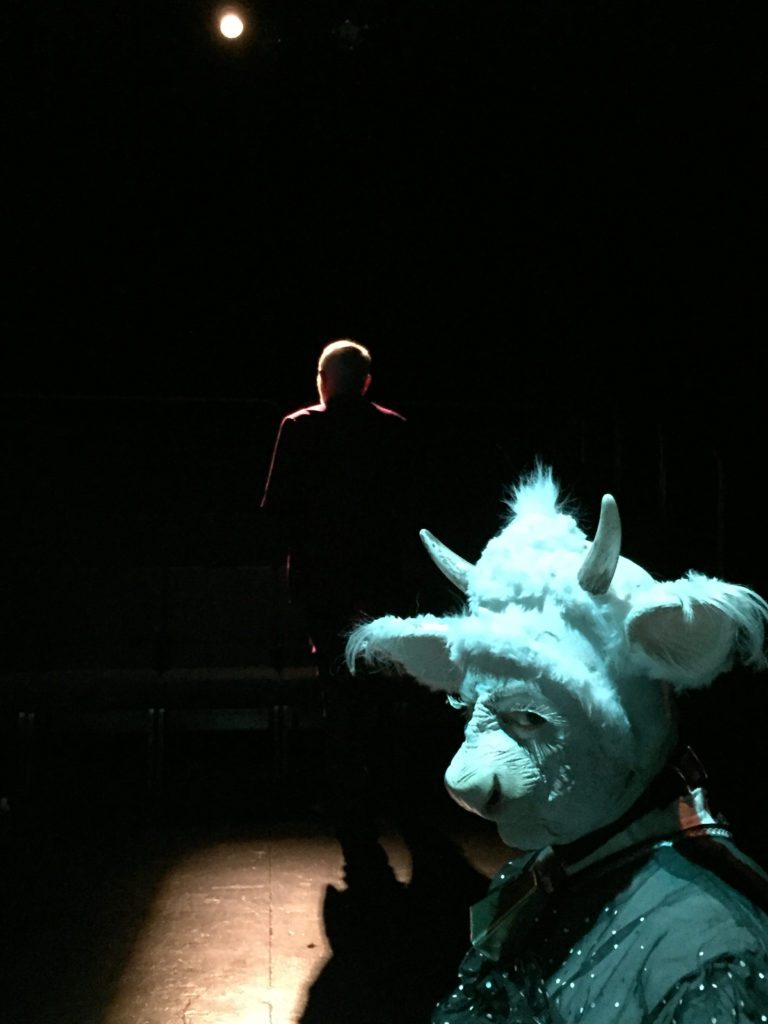If you’re a theater fan, you’ve seen Jim Hunt on various stages around town, usually playing kindly, warm-spirited, avuncular fellows. But in casting him as Zeus in The Zeus Problem, Buntport Theater Company has slipped the leash and given him immense power — and you know how power corrupts. Wearing a plum-colored jacket, white socks and sweatpants (to facilitate his “rise,” he explains more than once, gesturing toward his testicles), Hunt is a cruel, sneering, narcissistic tyrant, a god who can call down thunderbolts and — if he so chooses — obliterate humanity. For a while he rants at the audience, a long curtain drawn closed behind him. When the curtain slides back, we see we’re at a sort of dinner party. At one end of a long table sits a dapper Henry David Thoreau, earnestly scribbling away at a translation of Aeschylus’s Prometheus Bound. At the other end is Prometheus, chained to his rock. Zeus has condemned him to a life of torment for stealing fire from the gods and giving it to humankind; a giant eagle continually tears out and eats his continually regenerating liver. That eagle is at the table, too, and so is Io, the beautiful maiden that Zeus transformed into a cow to prevent his wife, Hera, from sensing his lust for her.
Zeus has always disliked the way that he’s portrayed in Aeschylus’s play, particularly since he comes off far better in the playwright’s other works, so he’s here to harass Thoreau into doing him justice in the translation. He invents a game and orders everyone to play, collapses intermittently into sleep, argues, berates and threatens. As for the others, they have their own concerns — human, linguistic, metaphysical and plain absurd. The eagle, for instance, played by a hilariously peevish Hannah Duggan, hates liver and, if she has to eat it, thinks it should at least come with onions. Erik Edborg’s sad and complex Prometheus is primarily preoccupied with his own suffering, but he still has enough energy to face off against Zeus.
First of all, he argues, the fire he stole carries multiple meanings, spiritual as well as practical. (He doesn’t mention, though he could have, Harvard anthropologist Richard Wrangham’s theory that discovering how to control fire and cook actually made us human in the first place — and there is some discussion in the play about the effect of feeding cats cooked or raw meat.) Prometheus also points out that it was he who first introduced writing, agriculture, architecture, medicine and other civilizing arts. As for the poor, wronged Io, plaintively played by Erin Rollman, she ruminates a great deal about her digestive process, which disgusts her while also leaving her constantly hungry.
Except for a few moments of Zeusian lunacy — Hunt’s strangely Michael Jacksonish, self-celebrating dances and his occasional thunder-accompanied threat — there’s not much action; the play is pretty much all talk. But you won’t be bored for a moment, because it’s fascinating talk. The Buntport artists, who collaborated on the script with Hunt, have always been interested in language, myth and the way stories morph over time. Myths are ever-changing, and the authorship of Prometheus Bound is now disputed, too. Thoreau, played with dignity and conviction by Brian Colonna, is determined that his translation will convey as much as possible the meaning of the original, which results in his thinking a lot about rhythm and vocabulary. Watching, I was reminded of Lucas Hnath’s The Christians, now playing at the Denver Center, where an evangelical church essentially falls apart when members start arguing about the existence of hell. It’s a potent reminder of the problem of taking any key text literally, particularly the Bible, patched together from so many ancient sources. Or the United States Constitution, which strict constructionists insist requires judges to deal only with the written text and not to draw inferences from it. Language is a slippery beast, and meaning changes with changing times.
It seems that Buntport had the Trump presidency very much in mind when creating The Zeus Problem, a story about what happens when all power is invested in a single figure, particularly one as mercurial and unaccountable as Zeus. Prometheus’s mention of torture sets contemporary teeth on edge, and Zeus’s clownish and impermeable ego is irresistibly reminiscent of the current president’s. Except that Jim Hunt is a whole lot funnier.
Juliet Wittman, February 14, 2017, Westword
